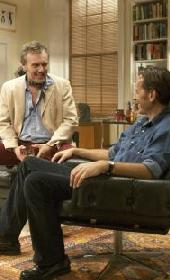SEARCH
REVIEWS
FEATURES
NEWS
Etcetera and
Short Term Listings
LISTINGS
Broadway
Off-Broadway
BOOKS and CDs
OTHER PLACES
Berkshires
London
LA/San Diego
Philadelphia
Elsewhere
QUOTES
On TKTS
LETTERS TO EDITOR
FILM
LINKS
MISCELLANEOUS
Free Updates
Masthead
Writing for us
A CurtainUp  London Review
London Review
 London Review
London ReviewOtherwise Engaged
|
I make a point of not sleeping with friends, or the wives of friends or the wives of acquaintances.
---- Simon Hench |

Anthony Head as Jeff and Richard E Grant as Simon
(Photo: Manuel Harlan) |
There is no doubt that Gray's play is deserving of a revival as it gives a picture of the mid-seventies, after the sexual revolution brought about partially by readily available contraception in the late 1960s, and before the greed of the Thatcherite 1980s or the Aids awareness of the 1990s. It opens with Simon Hench (Richard E Grant) fondling a vinyl long playing record of Wagner's Parsifal, putting it on to play after cleaning it and blowing dust away from the needle on his stereogram. The period details are nothing if not accurate. Hench then sinks into his leather sofa and an orgasmic expression comes over his face as the music inspires an intensity of emotional reaction. The irony is that his emotional response comes only when interacting with Wagner and not his fellow men.
Simon is an Oxford educated publisher, married but childless and living in Islington. On this afternoon a series of visitors interfere with the musical enjoyment he has scheduled. First his tenant and lodger Dave (Liam Garrigan) interrupts. Then his brother Stephen (Peter Wight), who struggles as a teacher in a public school and has five children and is looked down on by his brother. Simon's friend Jeff, a boozy journalist on a Sunday supplement (Anthony Head) is similarly uncommitted but maybe more honest in that he is unmarried. Davina (Amanda Ryan) is Jeff's girlfriend, or one of them, who is trying to find a publisher and who bares her breasts in a calculated move to get her book published. David Bamber plays Wood a man whose fiancée has been seduced, joining the catalogue of Hench's temporary wenches. Beth (Amanda Drew) is Hench's wife.
Richard E Grant is miscast as Hench. He seems to lack stage charisma and is rather self conscious as an actor and not entirely natural, as if he is waiting for what he wants to say next rather than listening and reacting to his fellow player. Hench has an acid wit but is also magnetic which Grant's performance was not. His style is so detached and lizard like that he fails to involve his audience, despite the plenty of witty one liners that Gray has given Hench. There were some people in the audience who had seen Alan Bates in the part and I suspect this is still a memorably hard act to follow even after a gap of thirty years. The most powerful scene is when Hench is accosted by the rather sad Wood who asks him, "What do you do about the stench of your adulteries?" Into this scene come Wood's memories of the humiliation meted out to him at his public school by Hench. This is one of the themes of Simon Gray's play, the dominance of school and university in setting our friendships and even future behaviour. Wood bullied at school continues to be a victim in his adult life.
After his wife comes to tell Hench that she has a lover and is leaving, he is forced to confront the shell of his empty and superficial life but although we think we have seen a tear, we are not really convinced that he will feel this pain. Otherwise Engaged has the curious effect of leaving its audience largely unengaged in this production.
|
OTHERWISE ENGAGED
Written by Simon Gray Directed by Simon Curtis Starring: Richard E Grant, Anthony Head With: Amanda Drew, Peter Wight, Liam Garrigan, Amanda Ryan, David Bamber Design: Simon Higlett Lighting: Tim Mitchell Sound: Clement Rawling Running time: One hour 55 minutes with one interval Box Office: 0870 890 2313 Booking until 28th January 2006 Reviewed by Lizzie Loveridge based on 1st November 2005 performance at the Criterion, Piccadilly Circus, London W1 (Tube: Piccadilly Circus) |





